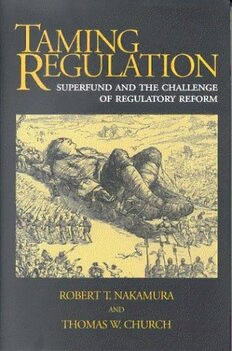
Taming Regulation: Superfund and the Challenge of Regulatory Reform PDF
158 Pages·2003·0.602 MB·English
Most books are stored in the elastic cloud where traffic is expensive. For this reason, we have a limit on daily download.
Preview Taming Regulation: Superfund and the Challenge of Regulatory Reform
Description:
Despite three decade of vigorous efforts at deregulation across all levels of government, regulation remains ubiquitous. It is disliked because it is unavoidably coercive: it forces individuals and businesses to do things - frequently costly and unpleasant things - that they don't want to. But few would argue that modern government can do without some recourse to the stick, irrespective of the popular appeal of the carrot. If regulatory programmes are to survive and remain effective, a central challenge is their endemic unpopularity and the political vulnerability that follows from it. Unlike much of the existing literature on regulation, this book begins with the assumption that the government's capacity to utilize regulation as a policy tool is important. The book examines the questions of how to make the inherently coercive aspects of regulation more politically acceptable in an anti-regulatory environment and how the legal and administrative challenges of reform in ongoing regulatory programmes might best be approached.
See more
The list of books you might like
Most books are stored in the elastic cloud where traffic is expensive. For this reason, we have a limit on daily download.
